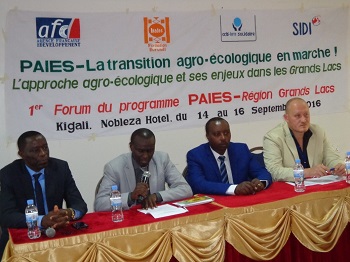Kigali forum on agro-ecology: agro-ecological transition in motion
Under the Support Programme for economic initiatives that contribute to ecological and social transformation of rural areas (PAYROLL) implemented in the Sahel (Mali, Niger, Burkina) and Great Lakes (Burundi, Rwanda, DRC) , Inades Formation Burundi, Deputy Regional representative PAIES, ACORD Rwanda, a program partner in Rwanda, organized from 14 to 16 September 2016 a forum on agro-ecology in collaboration with the Catholic Committee against Hunger for Development ( CCFD) – Terre Solidaire and the French Development Agency (AFD).

- Forum Opening Address by the Director General of Planning in the Ministry of Agriculture and Animal Resources of Rwanda
From 14 to 16 September 2016 was held in the Hotel Nobleza Kigali – Rwanda, a forum on agro-ecology with the theme: “Agroecology in the Great Lakes Region: approaches, issues, practices and perspective. ” The Forum, to be part of the Support Programme for economic initiatives that contribute to ecological and social transformation of rural areas (PAYROLL) implemented in the Sahel (Mali, Niger, Burkina) and Great Lakes ( Burundi, Rwanda, DRC), was organized by Inades Formation Burundi which ensures regional coordination program for the Great Lakes region and ACORD Rwanda project partner in Rwanda, in collaboration with the Catholic Committee against Hunger and for Development ( CCFD) – Terre Solidaire and the French Development Agency (AFD).
The objective of the forum was to create a first space for exchange of experience between practitioners of agroecology, especially among the program partners, and promote the sharing of analysis around the agro-ecological approach and its issues in the Great Lakes.

- A view of the participants
The opening of the forum was made by the Director General in charge of Planning at the Ministry of Agriculture and Animal Resources of Rwanda. He saw the participation of partners PAIES in the Great Lakes region and the Sahel, as well as other organizations working in the field of agro-ecology in SSA. Participants in the number 46 representing 32 organizations from Rwanda, Burundi, DRC, Uganda, South Africa, Cote d’Ivoire, Mali, and Niger.
A rich panel in knowledge and experience on agroecology

- Panelists “What realities of public-private international dynamics and climate smart agriculture in the Great Lakes region”?
Besides presentations that allowed a clarification of the theoretical concepts on agro ecology, climate change, its effects on the environment and international negotiations related thereto, the protection of the genetic heritage and the legal arsenal used in this field, etc. participants benefited from practitioners testimonies of agroecology from CSOs in all countries covered by the program PAIES but also other African experiences and Northern partner organizations.
Significant challenges
Participants identified the challenges promoting agroecology faces. These include:
- Weight multinationals that impose an agricultural model predator environmental condition of targets and enticing names, influence the agricultural policies of the North and South, by resorting to corruption needs, accelerate the passage heritage genetic public to the private domain to great fanfare unjust legal provisions, introduced in the nature of the seed programmed degeneration is a terrible threat to the living plant;
- The gradual withdrawal of many African states in agricultural investment to the benefit of private operators for whom the food is just a commercial good, with prioritization of agricultural trade policies at the expense of food policies concerned with social justice and human dignity ;
- The need to sustain the expertise peasant view of the demands of conservation and improvement of the genetic heritage; etc.
Relevant Forum recommendations

- Group work
The forum has made relevant recommendations including:
- the need for clarification of the priorities of African agriculture and concepts we use in agro-ecology;
- improving performance indicators and promotional material change in agro-ecology that needs to feed all the people to ensure its credibility;
- the need to technically assist farmers in the production of improved seeds instead of expect the state to do this work; the establishment of local certifications mechanisms inexpensive compared to current practices, too expensive for farmers’ organizations;
- continuing advocacy against the hegemony of agricultural multinationals, against land grabbing and to strengthening developing countries negotiating skills;
- better monitoring of the upcoming Rabat conference on the link between climate and agriculture;
- organization in each country round tables for exchange on the results and recommendations of the Kigali forum, etc.
A huge yard for Inades-Formation for the common good
Torchbearer for the promotion of sustainable family farming, Inades-Formation is determined to contribute to the success of this major project to agroecology, which must articulate three key dimensions to have any chance of success: practices, research (case study) and the social movement (citizen awareness and advocacy). The man needs to produce without destroying, feed the world looking after the planet and promoting food sovereignty. Extensive program in perspective.
PAIES: a program to promote and encourage the adoption of sustainable agricultural practices practices, respectful of ecosystems and natural resources
The overall objective of PAIES is “to promote a process of social and ecological transformation of rural areas in the Sahel region and the Great Lakes region, enabling populations of these rural areas to live well and sustainably while being supportive of other territories. ” In the Great Lakes region, the program is jointly funded by the CCFD-Terre Solidaire and the AFD and is implemented in Burundi ACORD Burundi, CAPAD (Confederation of Associations of Agricultural Producers for Development) and Inades-Formation Burundi; ACORD in Rwanda Rwanda; DRC by UWAKI North Kivu, in the regional coordination Inades-Formation Burundi. In the Sahel zone, it is implemented by AOPP (Association of Professional Peasant Organizations) and NKR (Horticultural Regional Network Kayes) in Mali, Viim Baoré UBTEC and Burkina (Union of Baoré Tradition Savings Credit / Naam) and federations and Mooriben FCMN-Niya Niger. THE regional coordination is ensured by the IRPAD (Institute for the Promotion of Alternative Development) in Mali.

- A view of the participants










